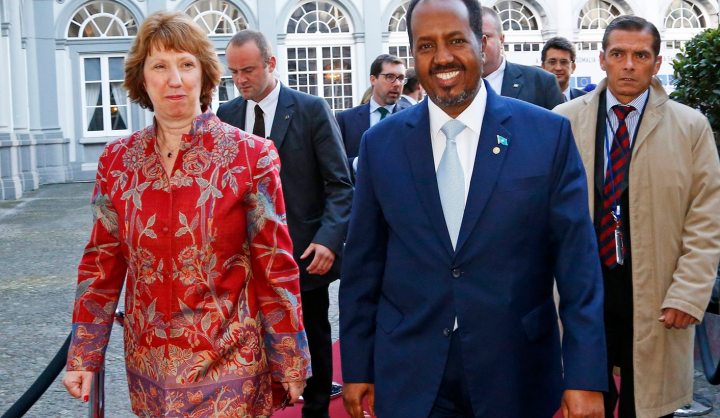Africa
Saving Somalia, one Belgian waffle at a time

Donors, diplomats and supplicating Somali politicians met in Brussels on Monday to raise money for Somalia, which needs it desperately. The meeting was dismissed by Al-Shabaab (who weren’t invited) as nothing more than a Belgian waffle. Still, when it comes with $2.4-billion of extra sugar, this is one Belgian waffle we should probably take seriously. By SIMON ALLISON.
Whatever you happen to think of Somali Islamist militant group Al Shabaab (little of it good, I imagine), they certainly have a way with words. The young, foreign-educated diaspora returnees who man their ever-changing Twitter account (every time it gets suspended they start a new one) rarely miss a chance for a clever insult or turn of phrase, and their reaction to the big donor conference in Brussels was no exception.
“It’s a bit like Belgian Waffles: sweet on the outside but really has not much substance to it,” the group tweeted. Usually, I’d agree. These international talk shops with their headline-grabbing pledges tend to make news rather than any real progress. This time, however, might be different.
The conference, organised by the European Union, was designed to give Somalia’s relatively new and inexperienced government access to money. Big money. The kind of funding necessary to drag Somalia down from its perch as Most Failed State in the Failed States Index. It was also a recognition of the progress that Somalia has (allegedly) made over the past year or so. With a new government in place, Al-Shabaab on the defensive and the faintest shoots of an economic recovery in place, everyone is starting to plan for the future.
So far, so normal. And so ineffective. We’ve seen plenty of similar pledging conferences, for Somalia and other countries, and few have made a real impact. The big money that’s always raised tends to be frittered away through unfulfilled pledges, corruption and misdirected spending.
This particular conference takes a subtly different approach. Instead of raising money, and then telling Somalia how to use it, this time the international community has taken on board the recommendations of the G7+ group of nations, a collective of 19 of the world’s most fragile and conflict-ridden states. Unlike the G8 and G20, which are similar constructions of international diplomacy, the G7+ is not aspirational. It’s a group you want to get out of as fast as possible. It includes Afghanistan, the Central African Republic, the Democratic Republic of Congo, Haiti, Guinea-Bissau and, of course, Somalia.
Recognising their collective need for international engagement, but frustrated with the form that foreign aid has taken in the past, representatives from the G7+ countries met in Busan in 2011 to discuss the problem and figure out some kind of solution.
In a resolution, the G7+ states described their position when it came to managing the inflows of foreign aid: “The way in which donors work in fragile states needs serious improvement … Making the transition from fragility is a long political process that requires country leadership and ownership. Political dialogue often founders because of a lack of trust, inclusion and leadership. Donors frequently bypass national interests and actors, providing aid in ways that are overly technical and fail to harmonise with the local context. Too often, they support short-term fixes at the expense of long-term sustainable results brought about by strengthening a country’s own capacity and systems.”
The G7+ solution was to build a new set of guidelines – a roadmap of how the international community can assist fragile states, drawn up by the fragile states themselves. It is called the New Deal for Engagement in Fragile States, and it puts peace-building and security at the heart of development.
The five main goals of the New Deal are: to foster inclusive political settlements and conflict resolution; to establish and strengthen people’s security; to address injustices and increase people’s access to justice; to generate employment and improve livelihoods; and to manage revenue and build capacity for accountable and fair service delivery. They are a marked departure from the usual donor priorities, which tend to address more immediate (and measurable) needs such as health and education. The New Deal’s reasoning is that no amount of investment in health is sustainable unless there is a functioning state to build a health system around, so it makes sense to build the state first.
Monday’s Somalia conference in Brussels was the first to be held under the rubric of the New Deal, and as far as Somalia’s government is concerned, it was a big success raising a tidy $2.4-billion dollars. Somali President Hassan Sheikh Mohamoud welcomed the cash and was quick to point out that, for once, this was an engagement based on “Somalia-led initiatives”. He promised to make security, legal reform, public finances and economic recovery his major priorities.
He’d better make good on this promise. For decades, fragile countries have been complaining about how little input they get into the aid process (not that this has prevented them accepting the money). It has also made a convenient excuse (although probably no less truthful for it) when that aid money has not worked and the fragile state remains mired in poverty and conflict.
With the New Deal, fragile states are finally making their voices heard and the developed world is listening. Somalia’s government, therefore, has a responsibility to make the New Deal work, or risk squandering a major opportunity for fragile nations to take charge of their own destiny. DM
Read more:
-
Somalia ‘New Deal’: EU pledge at Brussels conference, on BBC
Photo: European Union foreign policy chief Catherine Ashton (L) and Somali’s President Hassan Sheikh Mohamud (R) arrive at a conference called “New Deal in Somalia” in Brussels September 16, 2013. Somalia’s government and international donors will sign up to a three-year plan on Monday to rebuild the violence-torn country, backed by pledges of new funding that EU officials hope could reach more than one billion euros. REUTERS/Yves Herman


















 Become an Insider
Become an Insider